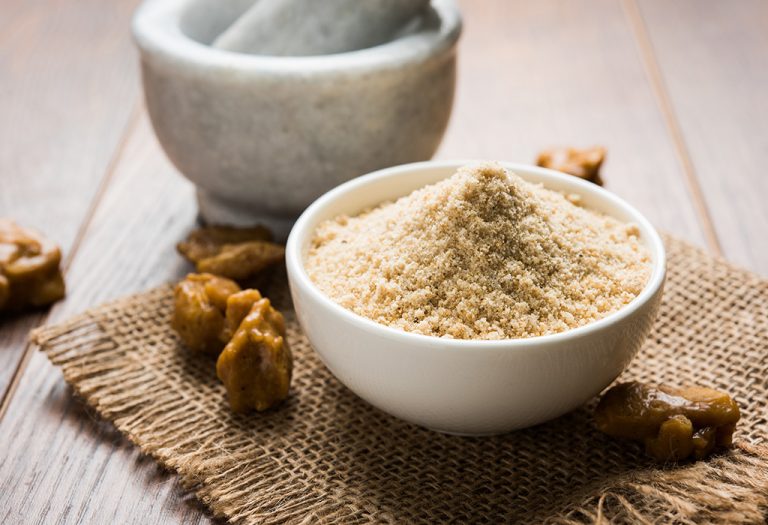Is Consuming Hing (Asafoetida) Safe during Pregnancy?
Hing or Asafoetida is a herb which is widely used in Indian recipes. It is obtained from the roots of a herb called Ferula. It provides a specific taste and flavour and is used mainly in vegetarian recipes. It is added to chutneys, spicy curries, pickles, and sauces. Asafoetida is known to have many health benefits as it comes from a family of medicinal herbs. Many people take asafoetida to get relief from breathing problems. Women also take it to cure any menstrual problem they may have as it stimulates the uterus. It helps in restarting your menstrual period if it has stopped for some reason. It is also useful in treating sexually transmitted diseases and a number of genital infections. Many people also use asafoetida to fight depression as it is said to be a nerve stimulant. It is also used for various other purposes:
- Used to treat calluses and corns when applied directly on the skin
- Used to make an essential oil widely used in aromatherapy
- Can treat an upset stomach, irritable colon, and painful gas
In this article, we’ll take a look at everything you need to know about eating asafoetida during pregnancy.
What Is Hing (Asafoetida)?
Hing, also known as asafoetida, is a resinous gum obtained from the roots of a perennial herb called Ferula asafoetida, which is native to Afghanistan and Iran. It has been used for centuries in cooking, traditional medicine, and rituals in South Asian and Middle Eastern cuisines.
In cooking, hing is primarily used as a flavor enhancer and a digestive aid. It has a strong and pungent aroma when raw, but when cooked, it imparts a savory, umami flavor to dishes.
Besides its culinary uses, hing also has a long history of medicinal use. It is believed to have anti-inflammatory, antimicrobial, and digestive properties, and it has been used to treat various ailments such as indigestion, flatulence, and respiratory issues in traditional medicine systems like Ayurveda.
Can You Eat Hing while Pregnant?
Is asafoetida safe during pregnancy? In Indian food preparations, asafoetida (hing) is added in very small amounts (just a pinch) and so may not cause much harm if consumed during pregnancy. However, there are certain precautions that you need to take before consuming asafoetida during pregnancy. No doubt it can cure your flatulence or any colic pain, it can cause a miscarriage if taken in too high amounts. Hence, an overdose of hing can lead to serious complications for pregnant women.
Benefits of Hing During Pregnancy
During pregnancy, it’s crucial for expectant mothers to pay attention to their diet and ensure they’re consuming foods that are beneficial for both themselves and their developing baby. Hing, also known as asafoetida, can be a valuable addition to a pregnant woman’s diet due to its various health benefits. Following are the benefits of hing in pregnancy.
1. Digestive Aid
Hing is known for its digestive properties, which can help alleviate common digestive issues such as bloating, gas, and indigestion that pregnant women often experience due to hormonal changes and pressure on the digestive system.
2. Reduces Flatulence
Pregnancy hormones can sometimes lead to increased flatulence, causing discomfort for expectant mothers. Hing’s carminative properties can help reduce flatulence and relieve associated discomfort.
3. Antimicrobial Properties
Hing has antimicrobial properties that may help prevent bacterial infections in the digestive tract, reducing the risk of gastrointestinal issues that can be particularly troublesome during pregnancy.
4. Provides Flavor Without Onion and Garlic
Many pregnant women avoid onion and garlic due to their pungent odor and potential digestive discomfort. Hing can serve as a flavorful alternative, adding depth and taste to dishes without the need for these ingredients, especially in vegetarian cooking commonly preferred during pregnancy.
Side Effects of Asafoetida in Pregnancy
Below are a few side effects of consuming asafoetida or hing goli in pregnancy:
- Hing is restricted for pregnant women with blood pressure problems as it can interfere with blood pressure control.
- Hing has an abortifacient property. This means that it can cause the developing embryo to fail to implant into the uterine lining and die as a result. This property can stimulate menstruation and cause miscarriage too if hing is taken in high amounts.
- Hing is also known to be harmful to young children as it contains certain chemicals. It can mix with breast milk and get transferred to a newborn, increasing the risk of potential disorders in them.
- According to Ayurveda, consuming hing when you are pregnant will reduce the air elements or the ‘vata’ in your body, which can interfere with the development of nervous tissue in the foetus.
- Eating too much of hing can result in burping, gas, diarrhoea, swollen lips, and a throat infection which can be harmful to a pregnant woman and her unborn baby as well.
- Eating raw hing can cause vomiting and nausea because of its strong flavour and hence is unhealthy for pregnant women.
How to Include Hing in Your Pregnancy Diet?
Including hing, also known as asafoetida, in your pregnancy diet can offer various benefits, from aiding digestion to providing flavor. Following are ways to include hing in your pregnancy diet.
1. Incorporate Into Cooked Dishes
Add a pinch of hing to cooked dishes such as lentils, soups, stews, and vegetables to enhance flavor and aid digestion. Its savory taste can complement a wide range of dishes, making it an easy addition to your meals.
2. Mix With Ginger
Combine hing with grated ginger to create a paste that can be added to various dishes or consumed with warm water as a digestive tonic. Ginger also has digestive properties and can further support digestive health during pregnancy.
3. Use in Spice Blends
Include hing in homemade spice blends like garam masala or curry powder to add depth of flavor without relying on ingredients like onion and garlic, which some pregnant women prefer to avoid due to their strong odor and potential digestive issues.
4. Prepare Herbal Tea
Infuse hing into herbal teas known for their digestive benefits, such as peppermint or chamomile tea, to create a soothing and digestive-friendly beverage option during pregnancy. However, ensure that any herbal teas consumed during pregnancy are safe and recommended by your healthcare provider.
How to Apply Hing on the Stomach While Pregnant?
Thinking of using asafoetida during pregnancy third trimester, second trimester and even first? Hing serves as a beneficial remedy for alleviating abdominal cramps experienced by pregnant women when applied to the navel. According to a study published in the Journal of Traditional and Complementary Medicine, hing, acting as a natural buffer, works to neutralize stomach acidity, thereby aiding in the relief of intestinal gastric discomfort (1). You can apply hing on the stomach in the following way:
- Combine a small amount of Hing with a few drops of mustard oil.
- Recline on a flat surface, such as a floor or bed, and softly massage the mixture onto the navel area.
- This method provides immediate alleviation from discomfort related to flatulence and bloating.
- Alternatively, dissolve a small quantity of Hing in warm water and ingest it for quick relief. This approach is particularly effective for individuals who are averse to the taste of Hing.
FAQs
1. Can hing cause any adverse effects on the baby during pregnancy?
When used in culinary amounts, hing is unlikely to cause adverse effects on the baby during pregnancy. However, excessive consumption or use of hing supplements may potentially lead to adverse effects, so it’s crucial to use it in moderation.
2. Are there any specific pregnancy-related conditions where hing should be avoided?
Pregnant women with gastrointestinal disorders or those prone to allergies should exercise caution when consuming hing. Additionally, if you experience any adverse reactions after consuming hing, such as allergic reactions or gastrointestinal discomfort, it’s advisable to discontinue use and consult with your healthcare provider.
3. Can hing help alleviate pregnancy-related digestive issues?
Yes, hing is known for its digestive properties and may help alleviate common pregnancy-related digestive issues such as bloating, gas, and indigestion. However, pregnant women should consume it in culinary amounts and avoid excessive intake.
4. Are there any alternatives to Hing for pregnant women who prefer to avoid it?
Pregnant women who prefer to avoid hing can explore alternative herbs and spices to add flavor to their meals, such as ginger, fennel seeds, cumin, and cinnamon. These alternatives can provide similar digestive benefits without the need for hing.
It is best to avoid hing or asafoetida entirely in your first trimester of pregnancy. You can consume it in the second and third trimesters of your pregnancy but in a very small amount. Make sure to consult your doctor about consuming hing during pregnancy and stay safe.
References/Resources:
1 Amalraj. A, Gopi. S; Biological activities and medicinal properties of Asafoetida: A review (Journal of Traditional and Complementary Medicine); National Library of Medicine; https://www.ncbi.nlm.nih.gov/pmc/articles/PMC5506628/; July 2017
2. Farhadi. F, Asili. J, Iranshahy. M, Iranshahi. M; NMR-based metabolomic study of asafoetida (Fitoterapia); National Library of Medicine; https://pubmed.ncbi.nlm.nih.gov/31629871/; November 2019
3. Iranshahy. M, Iranshahi. M; Traditional uses, phytochemistry and pharmacology of asafoetida (Ferula asafoetida oleo-gum-resin)-a review (Journal of Ethnopharmacology); National Library of Medicine; https://pubmed.ncbi.nlm.nih.gov/21130854/; March 20111
4. Mahendra. P, Bisht. S; Ferula asafoetida: Traditional uses and pharmacological activity (Pharmacognosy Reviews); National Library of Medicine; https://www.ncbi.nlm.nih.gov/pmc/articles/PMC3459456/
5. Bagheri. S, Hedesh. S, Mirjalili. A, Dashti-R. M; Evaluation of Anti-inflammatory and Some Possible Mechanisms of Antinociceptive Effect of Ferula asafoetida Oleo Gum Resin (Evidence-Based Complementary and Alternative Medicine); National Library of Medicine; https://pubmed.ncbi.nlm.nih.gov/26427790/; October 2016
6. Saleem. M, Alam. A, Sultana. S; Asafoetida inhibits early events of carcinogenesis: a chemopreventive study (Life Sciences); National Library of Medicine; https://pubmed.ncbi.nlm.nih.gov/11292069/; March 2001
7. Mala. K, Thomas. J, Syam. D, Maliakel. B, Krishnakumar. I; Safety and Efficacy of Ferula asafoetida in Functional Dyspepsia: A Randomized, Double-Blinded, Placebo-Controlled Study (Hindawi); National Library of Medicine; https://www.ncbi.nlm.nih.gov/pmc/articles/PMC6129344/; August 2018
Also Read:
Eating Fenugreek during Pregnancy
Consuming Ajwain in Pregnancy
Drinking Jeera Water (Cumin) while Pregnant
Consuming Ajinomoto (MSG) in Pregnancy
Was This Article Helpful?
Parenting is a huge responsibility, for you as a caregiver, but also for us as a parenting content platform. We understand that and take our responsibility of creating credible content seriously. FirstCry Parenting articles are written and published only after extensive research using factually sound references to deliver quality content that is accurate, validated by experts, and completely reliable. To understand how we go about creating content that is credible, read our editorial policy here.


































